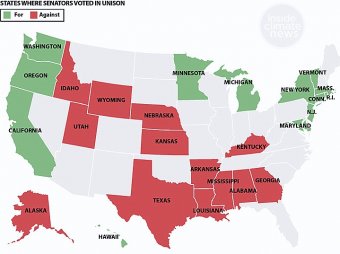
Credit: Paul Horn/InsideClimate News
Thirty-seven Republican senators voted against protecting the environment 19 different timesóevery single opportunity they hadóduring last week's contentious vote to fast-track approval of the Keystone XL pipeline. Across the aisle, 32 Democrats voted pro-environment 100 percent of the time.
That assessment was released Thursday by the political advocacy group the League of Conservation Voters, which tracked senators' votes on 18 different environment-, climate- and energy-related amendments attached to the Keystone XL bill, as well the Keystone bill itself. The report's results demonstrate the sharp partisan divide likely to rule Congress' climate-and-energy decisions for the next two years.
They also provide a glimpse into where the issue of climate change isóand is notóbeing debated within the United States. Twenty-four states had senators split on the issue, with one voting pro-environment and the other voting anti-environment most of the time.

Map showing how senators recently voted on Keystone XL and its proposed amendments. Click to enlarge.
The League of Conservation Voters has been tracking Congressional members' votes on environment-, public health- or energy-related bills since 1970. Every year it publishes the results in a National Environmental Scorecard. This latest breakdown is a special edition of the group's annual report, warranted because it hints at both how newly elected lawmakers and the Senate as a whole are approaching the issue of climate change. "We just couldn't wait," said Gene Karpinski, president of the League of Conservation Voters.
The Senate docket included amendments that would:
-
force companies working in the Alberta tar sands to pay to clean up future spills
-
renew clean energy tax credits
-
expedite drilling on public lands
-
boost funding for climate resiliency.
None got the necessary 60 votes to pass.
The new GOP Senate is sending a message that "payback to polluters" is more important than the environment and health of its constituents, said Karpinski.
A few Republicans, including Susan Collins of Maine, Kelly Ayotte of New Hampshire and Mark Kirk of Illinois, broke party lines and said "yes" to some of the amendments.
Overall, Republicans voted pro-environment just 5 percent of the time, on average. In comparison, Democrats voted pro-environment 93 percent of the time, on average.
Democratic Sen. Brian Schatz of Hawaii said there were a few glimmers of hope within the votes. One amendment he sponsored that acknowledged climate change is human-caused split the Senate 50-49 and gained five Republican yeses.
"[Climate change] has become a defining issue for both political parties," Schatz told reporters on Thursday. "It is a question of whether you are on the side of the facts, whether you are modern or not."
© InsideClimate News
http://insideclimatenews.org/news/20150205/partisan-zeal-hallmark-new-senates-votes-environment